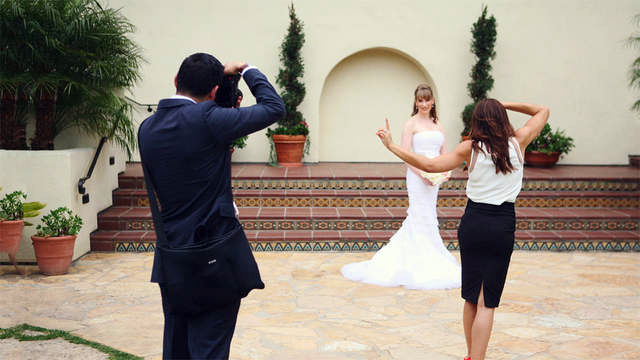Last Updated on July 27, 2023
Welcome to our article on how to become a second shooter for a wedding. If you have a passion for photography and want to gain experience in the wedding industry, becoming a second shooter can be a great opportunity for you. In this article, we will guide you through the steps to understand the role of a second shooter, develop your photography skills, build a strong portfolio, network with wedding photographers, assist a professional wedding photographer, learn about wedding photography equipment, market yourself as a second shooter, and most importantly, stay professional and reliable. By the end of this article, you will be well-equipped to embark on your journey as a second shooter for weddings.
Understand the Role of a Second Shooter
As a second shooter for a wedding, it is important to understand your role and responsibilities. Here are some key points to keep in mind:
- Assist the main photographer: Your main job is to support the primary photographer and capture additional angles and moments.
- Be flexible: Be prepared to adapt to different shooting styles and preferences of the main photographer.
- Stay in the background: Avoid getting in the way or distracting the couple and guests. Your goal is to blend in and capture candid moments.
- Communicate effectively: Coordinate with the main photographer to ensure you are both on the same page and capturing the shots needed.
Understanding the role of a second shooter is crucial for a successful wedding photography experience.
Develop Your Photography Skills
Developing your photography skills is crucial if you want to become a successful second shooter for a wedding. Photography is an art that requires practice and dedication. Start by familiarizing yourself with your camera and its settings. Experiment with different lighting conditions and compositions to improve your technical skills.
Additionally, study the work of renowned wedding photographers to gain inspiration and learn new techniques. Take online courses or attend workshops to enhance your knowledge and understanding of photography. Practice regularly by taking photos of various subjects to refine your skills.
Furthermore, seek feedback from experienced photographers to identify areas for improvement. Join photography communities or forums where you can share your work and receive constructive criticism. Remember, continuous learning and improvement are essential in this field.
Build a Strong Portfolio
Building a strong portfolio is essential for any aspiring second shooter in the wedding photography industry. Your portfolio is a visual representation of your skills and style, and it is what potential clients will use to judge your abilities.
Start by selecting your best work and organizing it in a professional manner. Choose a variety of images that showcase your ability to capture different aspects of a wedding, such as the ceremony, reception, and portraits.
Consider creating a website or online portfolio to showcase your work. This will make it easy for potential clients to view your portfolio and contact you. Additionally, consider printing a physical portfolio that you can bring to meetings or networking events.
Remember to regularly update your portfolio with your latest and best work. As you gain more experience and improve your skills, your portfolio should reflect this growth.
Building a strong portfolio takes time and effort, but it is an essential step in becoming a successful second shooter in the wedding photography industry.
To enhance the article and improve readability, I will use bullet points for section 5. “Network with Wedding Photographers”. Here are some key points to consider when networking with wedding photographers:
- Attend photography events and workshops where you can meet and connect with wedding photographers.
- Join online photography communities and forums to interact with professionals in the industry.
- Reach out to local wedding photographers and offer to assist them on shoots or shadow them during weddings.
- Attend bridal shows and industry events to meet photographers and showcase your work.
- Utilize social media platforms like Instagram and Facebook to connect with wedding photographers and showcase your portfolio.
- Offer to second shoot for free or at a discounted rate initially to gain experience and build relationships.
- Ask for referrals from photographers you have worked with or from other industry professionals.
- Join professional photography associations and attend their networking events.
- Always be professional, reliable, and respectful when interacting with photographers and potential clients.
By following these networking strategies, you can increase your chances of becoming a second shooter for weddings and establish valuable connections in the industry.
6. Assist a Professional Wedding Photographer
Assisting a professional wedding photographer is a great way to gain hands-on experience and learn from someone who has already established themselves in the industry. Here are some ways you can assist a professional wedding photographer:
- Reach out to local photographers and express your interest in assisting them.
- Offer to help with tasks such as carrying equipment, setting up lighting, and organizing shots.
- Observe how the photographer interacts with clients and captures important moments.
- Ask questions and learn from their expertise.
- Take note of their workflow and how they handle different situations.
- Offer to edit and retouch their photos to gain experience in post-production.
Assisting a professional wedding photographer not only allows you to learn from their skills and knowledge, but it also helps you build connections in the industry. By showing your dedication and willingness to learn, you may even have the opportunity to second shoot with them in the future.
Learn about Wedding Photography Equipment
As a second shooter for a wedding, it is crucial to familiarize yourself with the equipment used in wedding photography. This includes cameras, lenses, lighting equipment, and accessories. Understanding how to properly use and handle this equipment will not only enhance your skills but also make you more valuable to the main photographer.
Start by researching different camera models and their features. Consider investing in a high-quality DSLR camera that can capture high-resolution images in various lighting conditions. Additionally, learn about different types of lenses and their uses, such as wide-angle lenses for capturing group shots and telephoto lenses for capturing intimate moments.
Furthermore, familiarize yourself with lighting equipment, such as external flashes and reflectors, which can help you achieve the desired lighting effects. Lastly, don’t forget to learn about essential accessories like memory cards, tripods, and camera bags to ensure you are well-prepared for any situation.
By gaining knowledge about wedding photography equipment, you will be able to confidently handle any challenges that may arise during a wedding shoot and deliver high-quality images that meet the expectations of the main photographer and the couple.
Market Yourself as a Second Shooter
Once you have developed your photography skills and built a strong portfolio, it’s time to market yourself as a second shooter for weddings. This is an important step in establishing yourself in the industry and attracting potential clients.
One effective way to market yourself is by creating a professional website or online portfolio. This will allow potential clients to see your work and get a sense of your style and capabilities. Make sure to include a variety of wedding photos in your portfolio to showcase your versatility.
In addition to your online presence, consider attending wedding fairs or bridal shows to network with potential clients and other wedding professionals. This can be a great opportunity to showcase your work, make connections, and gain referrals.
Another effective marketing strategy is to utilize social media platforms such as Instagram and Facebook. Post your best wedding photos regularly and engage with your followers. This will help you build a following and attract potential clients.
Lastly, don’t underestimate the power of word-of-mouth marketing. Ask satisfied clients to refer you to their friends and family members who may be in need of a second shooter for their wedding.
By effectively marketing yourself, you can increase your chances of getting hired as a second shooter and building a successful career in wedding photography.
Stay Professional and Reliable
As a second shooter for a wedding, it is crucial to maintain a high level of professionalism and reliability. This means showing up on time, being prepared, and always being respectful to the main photographer, the couple, and the guests. Remember, you are there to support the main photographer and help capture the best moments of the day.
One way to stay professional is to dress appropriately for the occasion. Make sure you are dressed in professional attire that is comfortable and allows you to move freely. Avoid wearing anything that may distract or draw attention away from the main photographer.
Another important aspect of professionalism is communication. Make sure to communicate effectively with the main photographer and the couple. Ask for any specific shots they want or any particular style they prefer. Keep them updated on your progress and any challenges you may be facing.
Reliability is also key. Make sure to fulfill your commitments and meet deadlines. If you promise to deliver the photos within a certain timeframe, make sure to do so. Being reliable will not only help you build a good reputation but also increase your chances of being hired again in the future.
Overall, staying professional and reliable is essential for success as a second shooter. It will not only help you build strong relationships with photographers and clients but also contribute to your growth and development as a wedding photographer.
Wrapping it Up: Becoming a Second Shooter for a Wedding
After delving into the world of second shooting for weddings, it is clear that this role is not to be taken lightly. It requires a deep understanding of the responsibilities involved, as well as a commitment to honing your photography skills and building a strong portfolio. Networking with established wedding photographers and assisting them in their work can provide invaluable experience and connections.
Equally important is familiarizing yourself with the necessary equipment and marketing yourself effectively as a second shooter. Remember, professionalism and reliability are key traits that will set you apart in this competitive industry.
As you embark on your journey to become a second shooter, keep in mind that it is a continuous learning process. Embrace the challenges and opportunities that come your way, and never stop striving to improve your craft. With dedication and perseverance, you can carve out a successful career as a second shooter for weddings.
Learn how to become a second shooter for weddings. Understand the role, develop skills, build a portfolio, and network with photographers.
About The Author

Orochi Konya is a student of the web. He has been dabbling in it since he was young, and has become an expert in his own right. He loves all things digital, from making websites to programming to social media. In his spare time, Orochi enjoys indulging in his other passion: music. He loves listening to all kinds of music and often spends hours creating playlists on Spotify. He also enjoys drawing manga and watching anime in his free time. Orochi is a friendly pop-culture guru who is always happy to chat about the latest trends in both Japan and the U.S.

